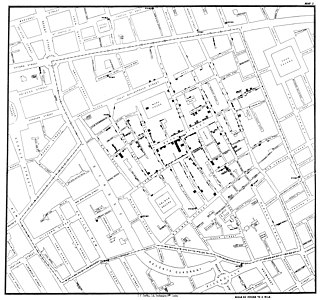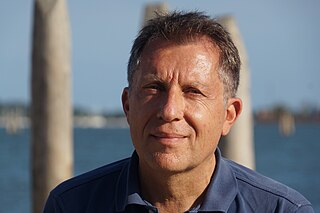Related Research Articles

Human geography or anthropogeography is the branch of geography that studies spatial relationships between human communities, cultures, economies, and their interactions with the environment, examples of which is studied in schools are urban sprawl, urban redevelopment etc. It analyzes spatial interdependencies between social interactions and the environment through qualitative and quantitative methods.

Social science is one of the branches of science, devoted to the study of societies and the relationships among individuals within those societies. The term was formerly used to refer to the field of sociology, the original "science of society", established in the 19th century. In addition to sociology, it now encompasses a wide array of academic disciplines, including anthropology, archaeology, economics, human geography, linguistics, management science, communication science and political science.
Social geography is the branch of human geography that is interested in the relationships between society and space, and is most closely related to social theory in general and sociology in particular, dealing with the relation of social phenomena and its spatial components. Though the term itself has a tradition of more than 100 years, there is no consensus on its explicit content. In 1968, Anne Buttimer noted that "[w]ith some notable exceptions, (...) social geography can be considered a field created and cultivated by a number of individual scholars rather than an academic tradition built up within particular schools". Since then, despite some calls for convergence centred on the structure and agency debate, its methodological, theoretical and topical diversity has spread even more, leading to numerous definitions of social geography and, therefore, contemporary scholars of the discipline identifying a great variety of different social geographies. However, as Benno Werlen remarked, these different perceptions are nothing else than different answers to the same two questions, which refer to the spatial constitution of society on the one hand, and to the spatial expression of social processes on the other.

Human ecology is an interdisciplinary and transdisciplinary study of the relationship between humans and their natural, social, and built environments. The philosophy and study of human ecology has a diffuse history with advancements in ecology, geography, sociology, psychology, anthropology, zoology, epidemiology, public health, and home economics, among others.

Economic geography is the subfield of human geography which studies economic activity and factors affecting them. It can also be considered a subfield or method in economics. There are four branches of economic geography.

Urban sociology is the sociological study of cities and urban life. One of the field’s oldest sub-disciplines, urban sociology studies and examines the social, historical, political, cultural, economic, and environmental forces that have shaped urban environments. Like most areas of sociology, urban sociologists use statistical analysis, observation, archival research, U.S. census data, social theory, interviews, and other methods to study a range of topics, including poverty, racial residential segregation, economic development, migration and demographic trends, gentrification, homelessness, blight and crime, urban decline, and neighborhood changes and revitalization. Urban sociological analysis provides critical insights that shape and guide urban planning and policy-making.

Urban geography is the subdiscipline of geography that derives from a study of cities and urban processes. Urban geographers and urbanists examine various aspects of urban life and the built environment. Scholars, activists, and the public have participated in, studied, and critiqued flows of economic and natural resources, human and non-human bodies, patterns of development and infrastructure, political and institutional activities, governance, decay and renewal, and notions of socio-spatial inclusions, exclusions, and everyday life. Urban geography includes different other fields in geography such as the physical, social, and economic aspects of urban geography. The physical geography of urban environments is essential to understand why a town is placed in a specific area, and how the conditions in the environment play an important role with regards to whether or not the city successfully develops. Social geography examines societal and cultural values, diversity, and other conditions that relate to people in the cities. Economic geography is important to examine the economic and job flow within the urban population. These various aspects involved in studying urban geography are necessary to better understand the layout and planning involved in the development of urban environments worldwide.
Feminist geography is a sub-discipline of human geography that applies the theories, methods, and critiques of feminism to the study of the human environment, society, and geographical space. Feminist geography emerged in the 1970s, when members of the women's movement called on academia to include women as both producers and subjects of academic work. Feminist geographers aim to incorporate positions of race, class, ability, and sexuality into the study of geography. The discipline has been subject to several controversies.

Urbanism is the study of how inhabitants of urban areas, such as towns and cities, interact with the built environment. It is a direct component of disciplines such as urban planning, which is the profession focusing on the physical design and management of urban structures, and urban sociology which is the academic field the study of urban life and culture.

Cultural geography is a subfield within human geography. Though the first traces of the study of different nations and cultures on Earth can be dated back to ancient geographers such as Ptolemy or Strabo, cultural geography as academic study firstly emerged as an alternative to the environmental determinist theories of the early 20th century, which had believed that people and societies are controlled by the environment in which they develop. Rather than studying pre-determined regions based upon environmental classifications, cultural geography became interested in cultural landscapes. This was led by the "father of cultural geography" Carl O. Sauer of the University of California, Berkeley. As a result, cultural geography was long dominated by American writers.
Urban studies or pre-urban planning education is based on the study of the urban development of cities. This includes studying the history of city development from an architectural point of view, to the impact of urban design on community development efforts. The core theoretical and methodological concerns of the urban studies field come from the social science disciplines of history, economics, sociology, geography, political science, anthropology, and the professional fields of urban planning, architecture, landscape architecture, and urban design. Urban studies is a major field of study used by paraprofessional practitioners of urban planning, it helps with the understanding of human values, development, and the interactions they have with their physical environment.
Animal geography is a subfield of the nature–society/human–environment branch of geography as well as a part of the larger, interdisciplinary umbrella of human–animal studies (HAS). Animal geography is defined as the study of "the complex entanglings of human–animal relations with space, place, location, environment and landscape" or "the study of where, when, why and how nonhuman animals intersect with human societies". Recent work advances these perspectives to argue about an ecology of relations in which humans and animals are enmeshed, taking seriously the lived spaces of animals themselves and their sentient interactions with not just human but other nonhuman bodies as well.

John Richard Urry was a British sociologist who served as a professor at Lancaster University. He is noted for work in the fields of the sociology of tourism and mobility.
Marxist geography is a strand of critical geography that uses the theories and philosophy of Marxism to examine the spatial relations of human geography. In Marxist geography, the relations that geography has traditionally analyzed — natural environment and spatial relations — are reviewed as outcomes of the mode of material production. To fully understand geographical relations, on this view, the social structure must also be examined. Marxist geography attempts to change the basic structure of society.

Geography is a field of science devoted to the study of the lands, features, inhabitants, and phenomena of Earth. The first recorded use of the word γεωγραφία was as a title of a book by Greek scholar Eratosthenes. Geography is an all-encompassing discipline that seeks an understanding of Earth and its human and natural complexities—not merely where objects are, but also how they have changed and come to be. While geography is specific to Earth, many concepts can be applied more broadly to other celestial bodies in the field of planetary science. Geography has been called "the world discipline" and "the bridge between the human and the physical sciences."

The sociology of space is a sub-discipline of sociology that mostly borrows from theories developed within the discipline of geography, including the sub fields of human geography, economic geography, and feminist geography. The "sociology" of space examines the social and material constitution of spaces. It is concerned with understanding the social practices, institutional forces, and material complexity of how humans and spaces interact. The sociology of space is an inter-disciplinary area of study, drawing on various theoretical traditions including Marxism, postcolonialism, and Science and Technology Studies, and overlaps and encompasses theorists with various academic disciplines such as geography and architecture. Edward T. Hall developed the study of Proxemics which concentrates on the empirical analysis of space in psychology.

The following outline is provided as an overview of and topical guide to geography:
The social sciences are the sciences concerned with societies, human behaviour, and social relationships.

Jacques Lévy is a professor of geography and urbanism at the School of Architecture, Civil and Environmental Engineering of the École Polytechnique Fédérale de Lausanne (EPFL). He is the director of Chôros Laboratory and of the Doctoral Program in Architecture and Science of the City. He is the cofounder of the scientific journal EspacesTemps.net. He published in French, along with Michel Lussault, the dictionary of geography and space of societies, Dictionnaire de la géographie et de l’espace des sociétés.He has contributed to in the epistemological and theoretical reform of geography as a science of the spatial dimension of the social, open to the social sciences and philosophy. Starting from political geography, he has most notably explored the city, urbanity, Europe and globalization. He works also for the introduction of non-verbal languages, especially audio-visual languages, at all levels of research. In 2013 he made a feature film, Urbanity/ies, which is intended as a manifesto for scientific film.
References
- ↑ "Environment and Planning A". SAGE Publications. Retrieved 2009-07-19.
- ↑ "Environment and Planning B". Pion. Retrieved 2009-07-19.
- ↑ "Environment and Planning C". Pion. 2016-12-14. Retrieved 2017-03-21.
- ↑ "Environment and Planning D". Pion. Retrieved 2009-07-19.
- ↑ "Environment and Planning E: Nature and Space: SAGE Journals" . Retrieved 2018-05-23.
- ↑ Johnston, Ron (2003). "Geography: A different sort of discipline?". Transactions of the Institute of British Geographers . 28 (2): 133–141. doi:10.1111/1475-5661.00083.
- ↑ "SAGE strengthens geography and psychology portfolio with acquisition of Pion". Sage. 28 May 2015. Retrieved 29 September 2015.